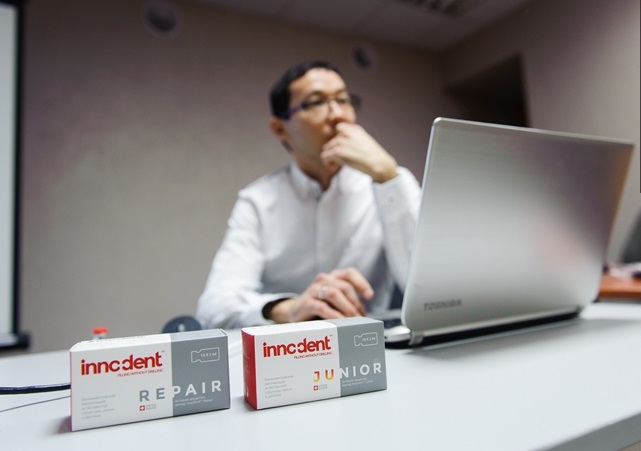ASTANA – Kazakh biotechnologist Bauyrzhan Aituov produces Innodent, an innovative product for treating tooth decay without painful drilling and fillings. The product can stop early tooth decay and stimulate natural regeneration of tooth enamel, he told The Astana Times in a recent interview.
Innodent Repair consists of a synthesised human protein called amelogenin, which plays a key role in fetal enamel development but is absent from fully developed teeth. Since the protein does not exist in nature, it needs to be synthesised under laboratory conditions. When dentists apply Innodent Repair to enamel damaged by tooth decay, over the course of three months, the protein draws minerals such as phosphorus, calcium and magnesium from the saliva to regenerate tooth enamel and repair cracks.
“Traditional methods such as drilling, filling and using crowns only stop the problem, but cannot cure it. Our product, however, can be used to repair enamel after wearing braces and in case of early tooth decay as well as to treat tooth sensitivity. It is safe and does not contain any toxic chemical ingredients. The idea behind the innovation came from nature; sharks do not experience tooth decay since their enamel is thick enough,” said Aituov.
Production of Innodent Repair was launched in 2016, when Kazakhstan’s National Agency for Technological Development awarded the company a grant to purchase automated equipment.
“We started from scratch: established a laboratory and conducted experiments according to foreign protocols. Initially, we did not aim to come up with a local product only. Instead, we wanted to create a product recognised all around the world. Therefore, we needed to carry out high-tech experiments and testing. At first, we had problems with the proper delivery of reagents and equipment. We, for example, travelled to the United States to purchase equipment twice, and this took us a lot of time,” he explained.
According to the biotechnologist, it is much easier to purchase inputs as a private start-up company due to an absence of bureaucracy. Moreover, they were able to buy materials and equipment directly from manufacturers without any intermediaries, which proved to be cheaper.
The company has a private laboratory in Astana near the TechnoPark research and innovation sector at Nazarbayev University. The staff includes four specialists working on research and development as well as 16 sales consultants who design market entry strategies and train dentists. Other tasks are outsourced.
“Currently, we are capable of producing 300,000 to 400,000 items of product a year; however, we plan to increase the capacity to a couple of million next year,” added Aituov.
The main clients using the product, each sales unit of which is sufficient to treat five to six teeth, are dentists who have been trained to apply Innodent. “We have approximately 200 to 250 clients mainly in the Commonwealth of Independent States (CIS). In Kazakhstan, we work with dental offices in Almaty, Astana, Shymkent, Atyrau, Kyzylorda and Ust-Kamenogorsk. There are several clients in Russia and Ukraine as well as in Libya, Saudi Arabia, Moldova, Israel, Germany and the United States,” he said.
By the end of the year, the company plans to enter the U.S. and European markets. In addition, according to Aituov, there are also people in Dubai, Brazil, Kuwait and Qatar who are interested in Innodent.
“There were cases when foreign companies wanted to purchase the right to produce our product; however, we do not want to sell it since we are afraid that in such a case it will no longer be accessible. Dentistry is very expensive around the world, therefore our main aim is to enter global markets to help billions of people live without tooth decay and have healthy, strong teeth,” he added.
The team is currently working on Innodent De-Senz, a ready-to-use product for treating tooth sensitivity at home.
“We started selling the product through Instagram and the first orders were made from Europe and the U.S. There is no solution to tooth sensitivity nowadays, but every second person after the age of 30 experiences it when eating something hot, cold or sweet. Out product will be the first professional kit to treat sensitivity in one year at a lower cost with no need to go to the dentist,” added Aituov.
The Kazakh biotechnologist is grateful to Kazakhstan for providing opportunities for research and business.
“I am fortunate to have been born and educated in Kazakhstan and for having the opportunity to study abroad on a Bolashak scholarship. When we started the project, the Ministry of Education and Science, Damu Entrepreneurship Development Fund and National Agency for Technological Development provided assistance, since they actively support commercialisation of innovative technologies,” said Aituov.
The company has spent little on advertising.
“Product promotion was mainly conducted in social media, such as Instagram and Facebook, and we also were invited to local television programmes. Advertising locally is too expensive; therefore, it would be of great benefit if national companies provided discounts for advertisements of local start-up companies and innovative products. However, the best advertisement is the fact that the product is in demand abroad,” noted Aituov.

